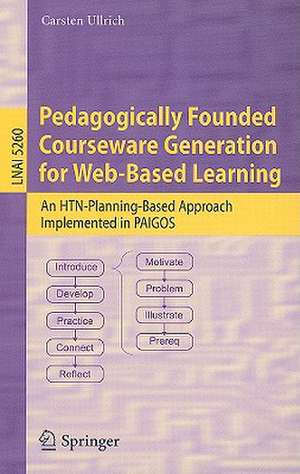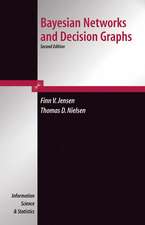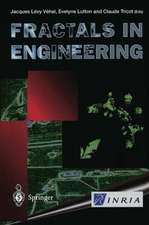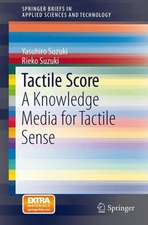Pedagogically Founded Courseware Generation for Web-Based Learning: An HTN-Planning-Based Approach Implemented in Paigos: Lecture Notes in Computer Science, cartea 5260
Autor Carsten Ullrichen Limba Engleză Paperback – 29 sep 2008
This book focuses on course generation based on Hierarchical Task Network planning (HTN planning). This course generation framework enables the formalization and application of complex and realistic pedagogical knowledge. The volume describes basic techniques for course generation, which are used to formalize seven different types of courses (for instance, introducing the learner to previously unknown concepts and supporting the learner during rehearsal) and several elementary learning goals (e.g., selecting an appropriate example or exercise). This framework has been implemented and evaluated with good results in several domains, with users from different countries and universities, in the context of an EU project.
Course generation based on HTN planning is implemented in PAIGOS and has been evaluated by technical, formative and summative evaluations.
Din seria Lecture Notes in Computer Science
- 20%
 Preț: 1061.55 lei
Preț: 1061.55 lei - 20%
 Preț: 307.71 lei
Preț: 307.71 lei - 20%
 Preț: 438.69 lei
Preț: 438.69 lei - 20%
 Preț: 579.30 lei
Preț: 579.30 lei -
 Preț: 410.88 lei
Preț: 410.88 lei - 17%
 Preț: 427.22 lei
Preț: 427.22 lei - 20%
 Preț: 596.46 lei
Preț: 596.46 lei - 15%
 Preț: 448.04 lei
Preț: 448.04 lei - 20%
 Preț: 353.50 lei
Preț: 353.50 lei -
 Preț: 389.49 lei
Preț: 389.49 lei - 20%
 Preț: 309.90 lei
Preț: 309.90 lei - 20%
 Preț: 645.28 lei
Preț: 645.28 lei - 20%
 Preț: 763.23 lei
Preț: 763.23 lei - 15%
 Preț: 580.46 lei
Preț: 580.46 lei - 20%
 Preț: 310.28 lei
Preț: 310.28 lei - 20%
 Preț: 655.02 lei
Preț: 655.02 lei - 20%
 Preț: 1183.14 lei
Preț: 1183.14 lei - 20%
 Preț: 340.32 lei
Preț: 340.32 lei -
 Preț: 449.57 lei
Preț: 449.57 lei - 20%
 Preț: 591.51 lei
Preț: 591.51 lei - 18%
 Preț: 938.83 lei
Preț: 938.83 lei - 20%
 Preț: 337.00 lei
Preț: 337.00 lei - 20%
 Preț: 649.50 lei
Preț: 649.50 lei - 20%
 Preț: 607.40 lei
Preț: 607.40 lei - 20%
 Preț: 1414.79 lei
Preț: 1414.79 lei - 20%
 Preț: 1024.44 lei
Preț: 1024.44 lei - 20%
 Preț: 583.40 lei
Preț: 583.40 lei - 20%
 Preț: 453.32 lei
Preț: 453.32 lei - 20%
 Preț: 575.49 lei
Preț: 575.49 lei - 20%
 Preț: 1075.26 lei
Preț: 1075.26 lei - 20%
 Preț: 585.88 lei
Preț: 585.88 lei - 20%
 Preț: 825.93 lei
Preț: 825.93 lei - 17%
 Preț: 360.20 lei
Preț: 360.20 lei - 20%
 Preț: 763.23 lei
Preț: 763.23 lei - 20%
 Preț: 340.32 lei
Preț: 340.32 lei - 20%
 Preț: 504.58 lei
Preț: 504.58 lei - 20%
 Preț: 369.13 lei
Preț: 369.13 lei - 20%
 Preț: 580.93 lei
Preț: 580.93 lei - 20%
 Preț: 343.62 lei
Preț: 343.62 lei - 20%
 Preț: 350.21 lei
Preț: 350.21 lei - 20%
 Preț: 583.40 lei
Preț: 583.40 lei - 20%
 Preț: 583.40 lei
Preț: 583.40 lei - 15%
 Preț: 438.59 lei
Preț: 438.59 lei - 20%
 Preț: 341.95 lei
Preț: 341.95 lei - 20%
 Preț: 238.01 lei
Preț: 238.01 lei - 20%
 Preț: 538.30 lei
Preț: 538.30 lei
Preț: 332.06 lei
Preț vechi: 415.08 lei
-20% Nou
Puncte Express: 498
Preț estimativ în valută:
63.55€ • 66.10$ • 52.46£
63.55€ • 66.10$ • 52.46£
Carte tipărită la comandă
Livrare economică 14-28 aprilie
Preluare comenzi: 021 569.72.76
Specificații
ISBN-13: 9783540882138
ISBN-10: 3540882138
Pagini: 276
Ilustrații: XVI, 257 p.
Dimensiuni: 155 x 235 x 14 mm
Greutate: 0.41 kg
Ediția:2008
Editura: Springer Berlin, Heidelberg
Colecția Springer
Seriile Lecture Notes in Computer Science, Lecture Notes in Artificial Intelligence
Locul publicării:Berlin, Heidelberg, Germany
ISBN-10: 3540882138
Pagini: 276
Ilustrații: XVI, 257 p.
Dimensiuni: 155 x 235 x 14 mm
Greutate: 0.41 kg
Ediția:2008
Editura: Springer Berlin, Heidelberg
Colecția Springer
Seriile Lecture Notes in Computer Science, Lecture Notes in Artificial Intelligence
Locul publicării:Berlin, Heidelberg, Germany
Public țintă
ResearchCuprins
Preliminaries.- Relevant Technologies.- Descriptive and Prescriptive Learning Theories.- PAIGOS.- General Principles.- Course Generation in Practice: Formalized Scenarios.- Implementation and Integration.- Evaluation.- Conclusions.- Related Work.- Future Work and Acknowledgments.
Recenzii
From the reviews:
"Ullrich describes the PAIGOS tutoring system and its evaluation. He refers to it as a course generation system because it generates a ‘personal book’ for the learner, based on the learner’s profile. PAIGOS is built on many recent innovations, including educational resources reachable through the WWW, the ActiveMath environment … . The methodology of PAIGOS … is flexible enough for instructional materials to be built according to any teaching approach. … PAIGOS is also evaluated … to generate courses for subjects other than mathematics." (D. L. Chester, ACM Computing Reviews, February, 2009)
"Ullrich describes the PAIGOS tutoring system and its evaluation. He refers to it as a course generation system because it generates a ‘personal book’ for the learner, based on the learner’s profile. PAIGOS is built on many recent innovations, including educational resources reachable through the WWW, the ActiveMath environment … . The methodology of PAIGOS … is flexible enough for instructional materials to be built according to any teaching approach. … PAIGOS is also evaluated … to generate courses for subjects other than mathematics." (D. L. Chester, ACM Computing Reviews, February, 2009)
Textul de pe ultima copertă
Automatic course generation is a very important area of research with numerous practical applications in e-learning. It has been studied since the 1980s within the fields of intelligent tutoring, AI and education, adaptive hypermedia and web-based educational systems. Many approaches have been proposed, but hardly any have resulted in generic and practically applied systems. A number of problems have remained unresolved. These problems are addressed by this work.
This book focuses on course generation based on Hierarchical Task Network planning (HTN planning). This course generation framework enables the formalization and application of complex and realistic pedagogical knowledge. The volume describes basic techniques for course generation, which are used to formalize seven different types of courses (for instance, introducing the learner to previously unknown concepts and supporting the learner during rehearsal) and several elementary learning goals (e.g., selecting an appropriate example or exercise). This framework has been implemented and evaluated with good results in several domains, with users from different countries and universities, in the context of an EU project.
Course generation based on HTN planning is implemented in PAIGOS and has been evaluated by technical, formative and summative evaluations.
This book focuses on course generation based on Hierarchical Task Network planning (HTN planning). This course generation framework enables the formalization and application of complex and realistic pedagogical knowledge. The volume describes basic techniques for course generation, which are used to formalize seven different types of courses (for instance, introducing the learner to previously unknown concepts and supporting the learner during rehearsal) and several elementary learning goals (e.g., selecting an appropriate example or exercise). This framework has been implemented and evaluated with good results in several domains, with users from different countries and universities, in the context of an EU project.
Course generation based on HTN planning is implemented in PAIGOS and has been evaluated by technical, formative and summative evaluations.
Caracteristici
Includes supplementary material: sn.pub/extras
















